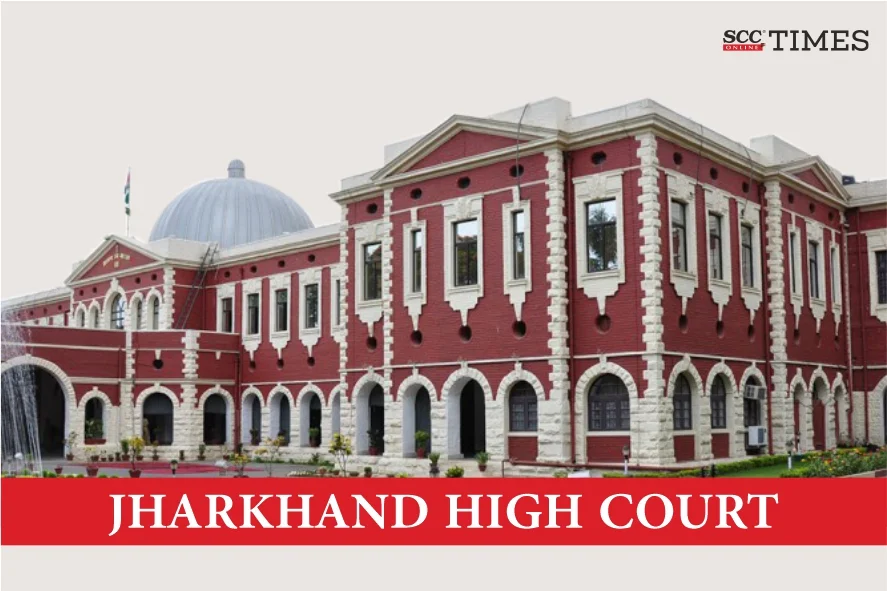Jharkhand High Court: In the instant criminal appeal preferred in 2017 by the convict against the judgment of conviction and order of sentence passed by the Trial Court in 2016 under Section 302 of Penal Code, 1860 (“IPC”), the Division Bench of Subhash Chand*. and Ananda Sen, JJ., held that the prosecution had failed to prove their case beyond reasonable doubt, and therefore the impugned judgment of conviction and order of sentence issued by the Trial Court requires interference. The Court thus set aside the conviction and sentence and the convict was acquitted of the charge levelled against him and was directed to be released.
Background
The convict-appellant preferred a criminal appeal against the judgment of conviction and the order of sentence by the Trial Court under Section 302 of the Penal Code, passed by the Additional Sessions Judge-III, West Singhbum, before the High Court.
In 2012, the informant submitted a written information with the concerned police station, wherein he alleged that the convict murdered his mother by throttling her, due to an alleged land dispute.
The Trial Court, holding the accused guilty for the offence under Section 302 of IPC, sentenced him to undergo imprisonment for life, along with fine of Rs.10,000.
Analysis and Judgment
The Court scrutinised the evidence to determine the legality and propriety of the impugned judgment and sentencing order of the Trial Court.
The Court said that the instant case was based on last seen evidence alone and the same remained uncorroborated by any other evidence.in that regard, the Court referred to the case of Jabir v. State of Uttarakhand, 2023 SCC OnLine SC 32, where the Supreme Court held that the court should not convict any accused only based on the last seen circumstances.
About the case of the prosecution that is based on circumstantial evidence, the Court pointed out that the evidence of motive becomes relevant and important, as for the lack of same, a prosecution case becomes doubtful.
Regarding the afore-stated pint, the Court relied on the case of Nandu Singh v. State of Madhya Pradesh, 2022 SCC OnLine SC 1454, wherein the Supreme Court held that the absence of motive in case of circumstantial evidence weighs in favour of accused.
It was also said by the Court in the instant case that the prosecution’s case is based on circumstantial evidence and the chain of circumstantial evidence is incomplete from the evidence adduced on behalf of the prosecution. It was further pointed out that circumstantial evidence should be conclusive, and free of every possibility of the hypothesis except the one to be proved.
Therefore, the Court noted that the impugned conviction was solely based on last seen evidence which was not corroborated with any evidence, hence the same cannot be said to be just and proper.
The Court also relied on the case of Sharad Birdhichand Sarda v. State of Maharashtra, (1984) 4 SCC 116, wherein the Supreme Court laid down five golden principles to be followed in a case that is based on circumstantial evidence, which are-
-
circumstances from which the conclusion of guilt is to be drawn must be fully established.
-
the facts so established must not be explainable on any other hypothesis except the guilt of the accused.
-
the circumstances should conclusive nature.
-
the circumstances should exclude every possible hypothesis except the one to be proved.
-
the chain of evidence must be so complete that there are no gaps that leave out any reasonable grounds for innocence of the accused and must establish that the act must have been performed by the accused.
In the view of the above analysis, the Court, while allowing the criminal appeal, held that the prosecution had failed to prove their case beyond reasonable doubt, and the judgment of conviction and the order of sentence passed by the Trial Court requires interference.
Hence the impugned judgment and order of the Trial Court was set aside and the convict was acquitted of the charge levelled against him and was directed to be released.
[Sur Singh Sidhu v. State of Jharkhand, 2024 SCC OnLine Jhar 657, Judgment on 18-03-2024]
Judgment by Justice Subhash Chand
Advocates who appeared in this case :
Advocates for the Appellant: Varsha Ramsisaria
Advocates for the Respondent: Priya Shreshtha, Special Public Prosecutor







